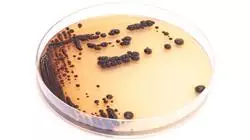University certificate
The world's largest faculty of nursing”
Why study at TECH?
Thanks to this 100% online Postgraduate certificate, you will apply the most innovative infection prevention measures and reduce bacterial contamination in the Food Chain”

The Food Chain plays a fundamental role in the transmission of Multidrug-Resistant Bacteria, challenging public health on a global scale. In this scenario, nurses have become an indispensable element in combating this threat by applying advanced infection management strategies and promoting safe practices in both food handling and consumption. To optimize their clinical outcomes, these professionals need to incorporate into their practice the most advanced strategies to mitigate the risk of transmission of microorganisms.
In this scenario, TECHpresents a revolutionary Postgraduate certificate in Multidrug-Resistant Bacteria in the Food Chain for Nursing. Designed by experts in this field, the academic itinerary will delve into the different antimicrobial resistances in food (among which ESBL, MRSA or colistin stand out). During the course of the program, graduates will acquire the innovative One Health approach, which will enable them to approach antimicrobial resistance from a holistic perspective. In addition, the study plan will provide nurses with the most effective strategies to prevent and control the spread of microbial resistance in the Food Chain.
It should be noted that the approach of this program reinforces its innovative character. In this line, TECHoffers a 100% online educational environment, tailored to the needs of busy nurses looking to advance their careers. Through the Relearning methodology, based on the repetition of key concepts to fix knowledge and facilitate learning, flexibility is combined with a robust pedagogical approach. In addition, graduates will have access to an extensive library of innovative multimedia resources that will allow them to enjoy an enjoyable and dynamic refresher course. The only thing professionals will need is an electronic device with Internet access to enter the Virtual Campus and embark on an experience that will significantly broaden their work horizons.
The current importance of Multi-Resistant Bacteria in the Food Chain makes this program a safe bet”
This Postgraduate certificate in Multidrug-Resistant Bacteria in the Food Chain for Nursing contains the most complete and up-to-date scientific program on the market. The most important features include:
- The development of practical cases presented by experts in Microbiology, Medicine and Parasitology
- The graphic, schematic and eminently practical contents with which it is conceived gather scientific and practical information on those disciplines that are indispensable for professional practice
- Practical exercises where the self-assessment process can be carried out to improve learning
- Its special emphasis on innovative methodologies
- Theoretical lessons, questions to the expert, debate forums on controversial topics, and individual reflection assignments
- Content that is accessible from any fixed or portable device with an Internet connection
You will delve into the Dissemination of Resistant Bacteria through Water and implement effective prevention measures in clinical settings”
The program’s teaching staff includes professionals from the sector who contribute their work experience to this specializing program, as well as renowned specialists from leading societies and prestigious universities.
The multimedia content, developed with the latest educational technology, will provide the professional with situated and contextual learning, i.e., a simulated environment that will provide immersive education programmed to learn in real situations.
This program is designed around Problem-Based Learning, whereby the professional must try to solve the different professional practice situations that arise during the course. For this purpose, students will be assisted by an innovative interactive video system created by renowned and experienced experts.
Do you want to delve into the genetic and biochemical mechanisms that allow bacteria to develop resistance to antibiotics? Get it with this program”

Take advantage of all the benefits of TECH Relearning methodology, which will allow you to organize your time and study pace”
Syllabus
Through this university program, nurses will have a thorough understanding of the epidemiology of Multidrug-Resistant Bacteria in the Food Chain. To this end, the syllabus will analyze the role of food in the spread of antimicrobial resistance. In line with this, the syllabus will delve into the One Health approach, which will enable graduates to detect antimicrobial resistance at an early stage. In addition, the program will provide professionals with the most innovative strategies to prevent and control the spread of microbial resistance in the food chain.

You will be able to recognize the most common Multidrug-Resistant Bacteria in food and their potential to cause diseases”
Module 1. Multidrug-Resistant Bacteria in the Food Chain
1.1. Multidrug-Resistant Bacteria in the Food Chain
1.1.1. The Role of the Food Chain in the Spread of Antimicrobial Resistance
1.1.2. Antimicrobial Resistances in Food (ESBL, MRSA, and Colistin)
1.1.3. The Food Chain within the One Health Approach
1.2. Dissemination of Antimicrobial Resistance through Food
1.2.1. Food of Animal Origin
1.2.2. Food of Plant Origin
1.2.3. Spread of Resistant Bacteria through Water
1.3. Spread of Resistant Bacteria in Food Production
1.3.1. Spread of Resistant Bacteria in Food Production Environments
1.3.2. Spread of Resistant Bacteria through Food Handlers
1.3.3. Cross-Resistance between Biocides and Antibiotics
1.4. Antimicrobial Resistance in Salmonella Spp
1.4.1. Salmonella Spp. Producing AmpC, ESBL and Carbapenemases
1.4.2. Resistant Salmonella Spp in Humans
1.4.3. Antimicrobial Resistant Salmonella Spp. in Farm and Meat Animals
1.4.4. Multidrug-Resistant Salmonella spp
1.5. Antimicrobial Resistance in Campylobacter Spp
1.5.1. Antimicrobial Resistance in Campylobacter Spp
1.5.2. Antimicrobial Resistant Campylobacter Spp in Foods
1.5.3. Multidrug-Resistant Campylobacter Spp
1.6. Antimicrobial Resistances in Escherichia Coli
1.6.1. AmpC, ESBL and Carbapenemase Producing E. Coli
1.6.2. Antimicrobial Resistant E. Coli in Farm Animals
1.6.3. Antimicrobial Resistant E. Coli in Food
1.6.4. Multidrug-Resistant E. Coli
1.7. Antimicrobial Resistance in Staphylococci
1.7.1. Methicillin-Resistant S. Aureus (MRSA)
1.7.2. MRSA in Food and Farm Animals
1.7.3. Methicillin-Resistant Staphylococcuys Epidermidis (MRSE)
1.7.4. Multidrug-Resistant Staphylococcus Spp
1.8. Antimicrobial Resistance in Enterobacteria
1.8.1. Shigella Spp
1.8.2. Enterobacter Spp
1.8.3. Other Environmental Enterobacteriaceae
1.9. Antimicrobial Resistance in Other Food-Borne Pathogens
1.9.1. Listeria Monocytogenes
1.9.2. Enterococcus Spp
1.9.3. Pseudomonas Spp
1.9.4. Aeromonas Spp and Plesiomonas Spp
1.10. Strategies to Prevent and Control the Spread of Microbial Resistance in the Food Chain
1.10.1. Preventive and Control Measures in Primary Production
1.10.2. Preventive and Control Measures in Slaughterhouses
1.10.3. Preventive and Control Measures in Food Industries

Updating your knowledge on Multidrug-Resistant Bacteria in the Food Chain will be easier with the multimedia contents you will find in the Virtual Campus. Enroll now!”
Postgraduate Certificate in Multidrug-Resistant Bacteria in the Food Chain for Nursing
Would you like to acquire advanced knowledge on the impact of multidrug-resistant bacteria on food safety and public health? TECH Global University has the ideal option for you. Through an innovative Postgraduate Certificate, delivered 100% online, you will receive an in-depth understanding of the risks associated with the presence of resistant bacteria in food and strategies for their prevention and control. During the program, you will explore the fundamentals of bacterial resistance in the food chain, including mechanisms of resistance development, sources of contamination and risks to human health. In addition, key topics such as epidemiological surveillance of multidrug-resistant bacteria in food, international standards or regulations, and food hygiene and safety practices to prevent the spread of these bacteria will be addressed. A distinctive feature of this course is its interdisciplinary approach, which combines knowledge in microbiology and public health with practical risk management in the food chain. Thus, you will learn to identify microbiological hazards, assess the risk of transmission of multidrug-resistant bacteria through food and implement effective control measures in food environments such as restaurants, hospitals and food establishments.
Get your degree with a Postgraduate Certificate in Multidrug-Resistant Bacteria in the Food Chain for Nursing.
The online mode of the course offers flexibility and accessibility, allowing you to access the content from any location and at flexible times. Through an advanced educational platform, you will benefit from interactive resources and updated study materials that will enrich your learning experience. The course is led by a team of professionals with extensive experience in food microbiology and public health, who provide expert guidance and ongoing support throughout the program. Their practical experience and up-to-date knowledge ensures that you receive high quality training relevant to addressing food safety challenges related to multidrug-resistant bacteria. Enrolling in this Postgraduate Certificate is a valuable opportunity for nurses who wish to contribute to the prevention of microbiological risks in food and improve public health. This advanced degree provides the tools necessary to understand and effectively address emerging challenges in food safety related to multidrug-resistant bacteria.







